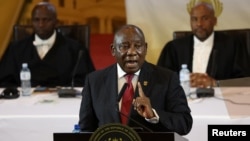The Quarterly Labor Force Survey reported that the number of unemployed working-age people in South Africa rose to 7.9 million after 46,000 more became unemployed in the last three months of 2023, increasing from 31.9%.
Unemployment among those aged 15-24 was 59.4% at the end of last year as Africa's most advanced economy continued to struggle to create jobs for young people entering the workforce.
The ANC has been in government since the end of the apartheid system of white minority rule in 1994 but has seen its support gradually wane over the last 30 years, largely because of its failure to deliver jobs, housing and services to millions of poor people.
Several polls predict the ANC may dip below 50% of the vote in this year's national election, which would be a landmark moment in South African politics. If the ANC loses its majority, it would need to go into coalition to remain in government and keep President Cyril Ramaphosa in office for a second and final five-year term.
A coalition has never happened on a national level in South Africa and it would end the dominance of the party once led by Nelson Mandela. The warning signs for the ANC came in local elections in 2021 when the party received less than 50% in a vote for the first time.
South Africa's main opposition party, the Democratic Alliance, is exploring the possibility of its own coalition agreement with numerous other smaller parties, hoping it might force the ANC out of government completely.
The date of this year's election has not yet been announced. It's expected to take place between May and August.

Forum